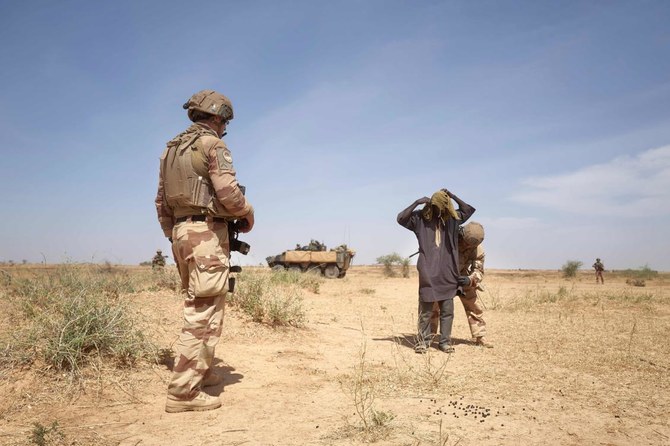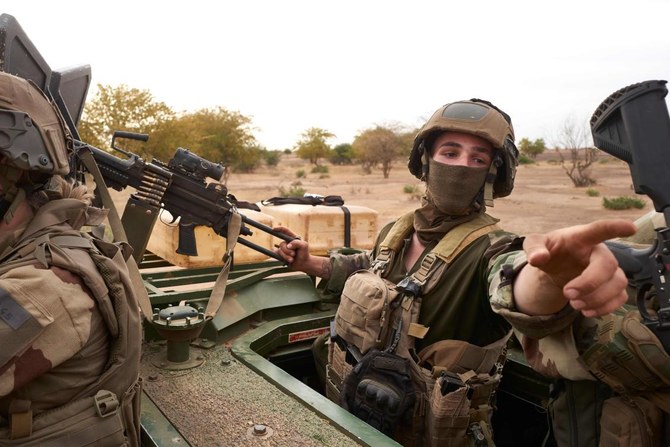ON THE MALI-BURKINA BORDER, Burkina Faso: It was the heart of the forest and there, in a marsh, lay a carpet of water lilies, their delicacy unveiled in the dawn light.
But the beauty belied the danger — the Tofa Gala forest, on Mali’s lawless border with Burkina Faso, was a haven for ruthless militants.
Guns in hand, French troops advanced on one side of the marsh, and their counterparts from Burkina Faso on the other.
Their goal: Assert control over an area where no troops had set foot for over a year.
Named Bourgou IV, the mission was the first official joint ground operation between the French army and the so-called G5 Sahel force, which pools troops from Burkina Faso, Chad, Mali, Mauritania and Niger.
In an exercise earlier this month, some 1,400 soldiers, 600 of them French, were deployed in the volatile region.
For militants, “it’s an ideal area to hide and handle logistics,” said Thibauld Lemerle, a French colonel.
Thousands of civilians and soldiers have died in violence across the Sahel which began when armed Islamists revolted in northern Mali in 2012.
The conflict has since swept into the center of Mali and spilled into neighboring Burkina Faso and Niger, inflaming ethnic tensions along the way.
Many thousands have fled their homes.
Belonging to a mosaic of groups from Al-Qaeda to Daesh and Ansarul Islam, the militants have exploited ethnic divisions and a feeling of abandonment to enmesh themselves in local communities.
France has some 4,500 troops in the region and the G5 Sahel force has a projected total of 5,000 — a goal clouded by chronic funding, training and equipment problems.
They play a game of cat and mouse in this vast territory with a highly mobile enemy, able to vanish into the desert.
“They are here but hidden, we search for them but can’t find them,” said a non-commissioned officer, assault rifle in hand. “This is an impossible war.”
A detonation occurred — a warning shot from one of the Burkinabe soldiers as a local passed by.
The troops walked on. They discovered two abandoned motorbikes suspected of belonging to militants and impounded them.
They marched for hours and find nothing.
“It’s like looking for a needle in a haystack, he could be here, he could already be gone. Shooting can start without warning,” said a lieutenant who gave his name as Julien.
The soldiers marched on. Ahead, six huts stood in the blazing sun and women and children clustered beneath an acacia tree. There were no men in sight.
The French troops searched the huts in silence. One cut open a mattress while another shakes mats.
“We’re looking for means of communication and components used to make IEDs,” said Pierrick, the head of the search party, referring to roadside bombs.
The troops found a few phones and set off on their two-hour hike to get back to their vehicles.
“We can’t search like that, cutting up mattresses, see how those people were looking at us,” one private from the search party said later, going over the events of the day.
“But it’s the only way,” another private said. “Imagine if a phone were hidden in the mattress.”
A French officer explained the rationale behind the search missions. In areas under militant influence, he said, “everyone can be a potential enemy.”
Caught between a rock and a hard place, locals pay a tough price.
Malian and Burkinabe forces have several times been accused of alleged human rights abuses. French forces are told to uphold strict rules of engagement.
The French army says there are mechanisms in place during joint operations to prevent incidents.
But a French official, who declined to be named, said that their partners do not always respect the rules.
The French and Sahel armies also differ widely in terms of equipment, which has its upsides and downsides.
One French officer said that French troops trundle slowly in armored vehicles but the Sahel troops zip around on motorbikes.
A Burkinabe officer said the French security measures and loud convoys offer the militants time to escape. “It’s normal that the French never find anything when they arrive,” he said. “With our motorbikes, we’re more mobile.”
But African troops are also far more exposed. Only days earlier, two Burkinabe soldiers riding a motorbike were killed by a roadside bomb.
In total some 170 Sahel soldiers have been killed since September in presumed militant attacks, including about 40 Malian soldiers who died in a single ambush in November.
One French soldier, by comparison, has died.
Despite years of training by French forces, the Sahel armies struggle with many problems.
Captain Wendimanegde Kabore, a Burkinabe unit commander, said that securing food and water was especially difficult. On many evenings, Burkinabe troops go to their French counterparts for a ration pack.
The arduous march is lightened at times.
French intelligence intercepted a message from one of the heads of Ansarul Islam just a few kilometers from the Bourgou operation’s positions.
The army sent out 80 French soldiers in a bid to capture him, supported by drones and a Mirage 2000 warplane.
And toward the end of the same day, forces also caught wind of local informants who tip off the militants about army troops.
An armored convoy took off in a cloud of dust, arriving at the village. Three men fled and threw objects into the undergrowth. One was arrested several minutes later.
Dressed in old jogging trousers and a sports vest, he stayed quiet.
“We took a telephone. He ran away when we arrived but the inhabitants stayed put, which is suspicious,” said Julien, the lieutenant. “But we have nothing on him, so we’re going to let him go.”
About a hundred phones were confiscated over two weeks of Bourgou IV operations. Troops withdrew from the area on November 17.
Twenty-four people were killed or captured, according to the French army, and about 60 motorbikes seized.
Despite these seemingly meager returns, military chiefs said they were pleased with the results, arguing that the operation had disrupted the militants and caused many to flee.
“Not every day is a rendezvous with glory,” said Col. Raphael Bernard. “But we work together, we shake things up and we fight.”
French and Sahel soldiers step up campaign against militants
French and Sahel soldiers step up campaign against militants

- Named Bourgou IV, the mission was the first official joint ground operation between the French army and the so-called G5 Sahel force
- In an exercise earlier this month, some 1,400 soldiers, 600 of them French, were deployed in the volatile region
UK’s Starmer discussed Ukraine war with leaders of US, Italy, France and Germany

British Prime Minister Keir Starmer on Sunday discussed the war in Ukraine with leaders of the US, Italy, France and Germany, a Downing Street spokesperson said.
Looking ahead to US President Donald Trump’s call with Russia’s President Vladimir Putin on Monday, the leaders discussed the need for an unconditional ceasefire and for Putin to take peace talks seriously, the spokesperson said.
They also discussed the use of sanctions if Russia failed to engage seriously in a ceasefire and peace talks, the spokesperson added.
UK’s Foreign Minister David Lammy on Saturday accused Moscow of obfuscating after talks between Ukraine and Russia on a possible ceasefire ended in less than two hours and Trump said “nothing could happen” until he had met directly with Putin.
Paris airport chaos to enter second day after air traffic breakdown

- The breakdown hit on Sunday and has affected thousands of passengers
ORLY, France: An air traffic control breakdown at Paris-Orly airport caused the cancelation and delay of hundreds of flights and the aviation authority said the chaos would extend into Monday.
The breakdown hit on Sunday and has affected thousands of passengers with some already sat in planes at the French capital’s second biggest airport when flights were canceled.
The control tower breakdown forced the cancelation of about 130 flights in and out of Orly Sunday, officials said.
It had not been resolved by late Sunday and the DGAC French civil aviation authority said it was “asking airlines to reduce their flight schedules by 15 percent” on Monday and warned that “delays are expected.”
“The situation is improving but still requires traffic regulation,” the DGAC said.
The authority blamed an air traffic control “malfunction.” An airport source said there had been a “radar failure.”
Flights to European and North Africa destinations and across France were among those hit. Long queues formed at terminals amid a frenzied rush to find alternative transport.
“We were in the aircraft, all seated and strapped in, ready to go, when they made us disembark and collect our bags ... then began the ordeal,” said Azgal Abichou, a 63-year-old business owner.
“The only option is a 300 euro flight — and there’s only one seat left, but there are two of us and we are not even sure it will take off,” said Romane Penault, a 22-year-old student. “So for now, we’re going home.”
Agnes Zilouri, 46, tried desperately to find a seat for her 86-year-old mother and six year old son in the terminal. The family should have taken a flight to Oujda in Morocco on Sunday evening to go to a funeral.
“The flight is canceled. Fortunately I am with my mother,” she said.
Last year Orly handled about 33 million passengers, approximately half the number of the main Paris Charles de Gaulle international airport.
Authorities say suspect in California fertility clinic bombing left behind ‘anti-pro-life’ writings

- US Attorney Bilal “Bill” Essayli, the top federal prosecutor in the area, called the writings “anti-pro-life”
A 25-year-old man the FBI believes was responsible for an explosion that ripped through a Southern California fertility clinic left behind “anti-pro-life” writings before carrying out an attack investigators are calling an act of terrorism, authorities said Sunday.
Guy Edward Bartkus of Twentynine Palms, California, was identified by the FBI as the suspect in the apparent car bomb detonation Saturday that damaged the clinic in the upscale city of Palm Springs in the desert east of Los Angeles.
Investigators believe Barktus died in the blast, which a senior FBI official called possibly the “largest bombing scene that we’ve had in Southern California.” A body was found near a charred vehicle outside the clinic.
Bartkus attempted to livestream the explosion and left behind writings that communicated “nihilistic ideations” that were still being examined to determine his state of mind, said Akil Davis, the assistant director in charge of the FBI’s Los Angeles field office. US Attorney Bilal “Bill” Essayli, the top federal prosecutor in the area, called the writings “anti-pro-life.”
The Associated Press reported Saturday night that those writings professed a sentiment that the world should not be populated.
“This was a targeted attack against the IVF facility,” Davis said Sunday. “Make no mistake: we are treating this, as I said yesterday, as an intentional act of terrorism.”
The bombing injured four other people, though Davis said all embryos at the facility were saved.
“Good guys one, bad guys zero,” he said.
Authorities were executing a search warrant in Twentynine Palms, a city of 28,000 residents about 50 miles (80 km) northeast of Palm Springs, as part of the investigation.
The suspect posted writings online and attempted to record the explosion, though authorities said the video failed to upload. An official who was not authorized to discuss details of the attack spoke on condition of anonymity to the AP.
The blast gutted the single-story American Reproductive Centers clinic, though a doctor said its staff members were safe.
“Thank God today happened to be a day that we have no patients,” Dr. Maher Abdallah, who leads the clinic, told the AP in a phone interview Saturday.
Former US President Biden diagnosed with ‘aggressive’ prostate cancer

- Biden, 82, was diagnosed on Friday after having experienced urinary symptoms
Former US President Joe Biden has been diagnosed with an “aggressive form” of prostate cancer that has metastasized to the bone, his office said in a statement on Sunday.
Biden, 82, was diagnosed on Friday after having experienced urinary symptoms, and he and his family are reviewing treatment options with doctors, the statement said.
“While this represents a more aggressive form of the disease, the cancer appears to be hormone-sensitive which allows for effective management,” his office said.
Biden, who served as president from 2021 to 2025, abruptly ended his bid for reelection last July, weeks after a halting performance during a debate against Republican candidate Donald Trump prompted panic among his fellow Democrats. Vice President Kamala Harris took over as the party’s nominee but lost in November to Trump.
Biden’s physical health and mental acuity drew intense media scrutiny even before the debate. At the time of his election, Biden was the oldest person to win the presidency.
Trump, 78, broke that record when he defeated Harris last year.
Anti-immigration minister becomes leader of French conservatives

- Bruno Retailleau has become leader of the conservative Republican party (LR), which traces its origins to postwar leader Charles de Gaulle
PARIS: France’s Interior Minister Bruno Retailleau, who has called for radical action to cut immigration numbers, easily won an election to become leader of the conservative Republican party (LR), according to results released Sunday.
Retailleau won 74 percent of the vote from party members against 25 percent for Laurent Wauquiez, the head of the party in the French national assembly.
Although LR and its allies hold only 60 seats in France’s 577-member national assembly and the party candidate barely registered in the 2022 presidential vote, experts predict a better run in 2027 when President Emmanuel Macron must step down.
The LR’s last leader Eric Ciotti quit the party last year after calling for an alliance with the far-right National Rally (RN). The LR has wrangled since over its stance but has adopted a tougher line on issues such as immigration.
National opinion polls currently suggest the RN would perform well in the 2027 election, which has however been shaken by legal woes for its figurehead Marine Le Pen.
Retailleau, in his government post since last year, has emerged as one of the most high-profile ministers in the centrist-led coalition government. He said he would stay in the government but he is likely to use his victory to press his case for the presidency.
“Our political family is now able to carry our project forward for the presidential election,” Retailleau told broadcaster TF1 after the results were announced.
The LR is the successor of the UMP, which traces its origins to postwar leader Charles de Gaulle and was the party of former presidents Jacques Chirac and Nicolas Sarkozy.
Some 80 percent of the 120,000 LR party members took part in the weekend vote for the leader. The LR membership had increased from 43,859 to 121,617 in the two months before the leadership election.























